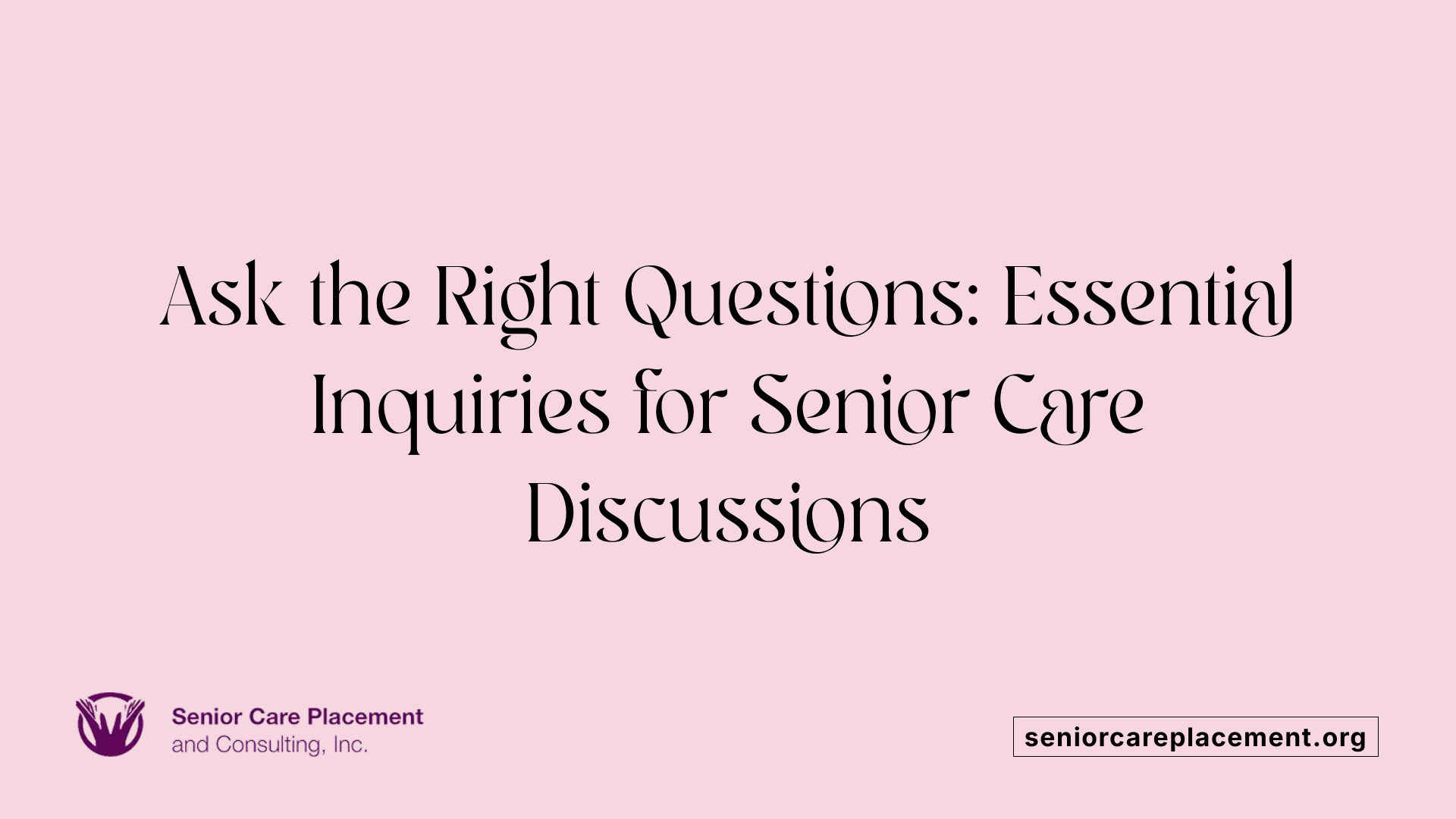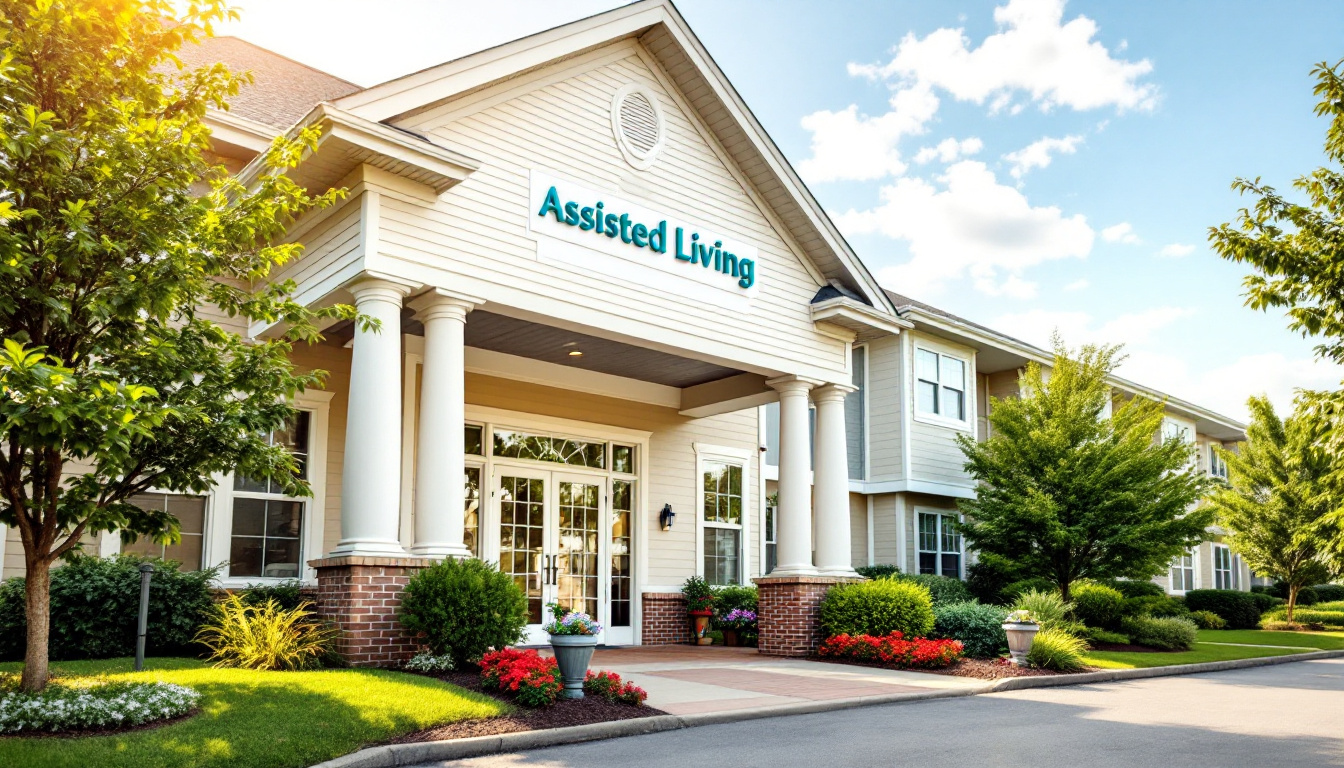How to Make the Most of Senior Care Placement Consultations
Navigating Senior Care Options with Confidence and Clarity

Understanding the Path to Quality Senior Living
Making informed decisions about senior care involves understanding the process of placement consultations, exploring various care options, and engaging with reputable agencies. This article provides a comprehensive guide on how to effectively utilize senior care placement consultations, ensuring a smooth transition and optimal outcomes for your loved ones.
Maximizing the Effectiveness of Senior Care Placement Consultations

Preparation for the consultation
A successful senior care placement process begins with thorough preparation. Families and seniors should compile detailed information about medical needs, lifestyle preferences, financial constraints, and geographic location. Reflecting on these aspects helps guide discussions and ensures that the consultant can make tailored recommendations.
Asking detailed questions about care options, costs, and services
During the consultation, it is crucial to inquire about all available care levels—such as assisted living, memory care, or nursing homes—and understand the specific services included. Questions should also cover costs, billing procedures, and what additional expenses might arise. Clarifying service offerings, staff qualifications, and resident activities helps ensure a comprehensive understanding of each option.
Assessing facility quality and reputation
Evaluating a facility’s quality involves reviewing official ratings such as Medicare's Nursing Home Compare scores, reading online reviews, and seeking opinions from local community members. It is advisable to examine aspects like staff-to-resident ratios, health and safety records, and complaint histories issued by state agencies. Visiting facilities personally and staying for a meal are recommended steps to gauge ambiance and resident satisfaction.
Transparency about agency compensation
Reputable placement agencies should be upfront about their fee structure. Many, like Above and Beyond, offer their services free of charge, funded through referrals. It is vital to ask about compensation sources to maintain transparency and make options clear to families, avoiding conflicts of interest.
Conducting facility tours, including stays and meals
Touring potential residences provides firsthand experience of the environment. During visits, families should observe the cleanliness, safety measures, and maintenance of the facility. Staying for a meal can offer insight into food quality and community atmosphere. These steps help determine whether a facility truly meets the senior’s expectations.
Respecting client preferences and ethical guidelines
Throughout the consultation process, it is essential to prioritize the senior’s wishes, cultural considerations, and ethical standards. Respect for personal preferences, such as language, religious practices, or cultural needs, enhances comfort and satisfaction. Consultants should adhere to ethical guidelines, including honesty, confidentiality, and impartiality.
| Aspect | Best Practices | Notes |
|---|---|---|
| Preparation | Gather detailed health, lifestyle, and financial info | Ensures tailored recommendations |
| Questioning | Ask about care levels, costs, amenities | Clarifies all options and expenses |
| Facility Assessment | Review ratings, visit facilities, stay for meals | Gains firsthand impressions |
| Transparency | Disclose referral fees and compensation | Builds trust with clients |
| Tours and Stays | Visit in-person, dine onsite | Assesses environment and community |
| Client Preferences | Respect cultural, medical, and personal needs | Maintains dignity and satisfaction |
Following these practices enhances the effectiveness and trustworthiness of senior care placement consultations, ultimately leading to better placement decisions and improved quality of life for seniors.
Questions to Ask During Senior Care Discussions

What questions should I ask during senior care placement discussions?
When exploring senior care options, it's essential to gather comprehensive information to make an informed choice. Begin by asking about the range of care services offered—do they provide personalized medical, emotional, and emergency support tailored to individual needs? Clarify how care plans are customized for each resident.
Next, inquire about staff qualifications, including training, certification, and staffing ratios, especially in terms of safety protocols like 24/7 availability and emergency procedures. Understanding the community's policies on resident activities, social engagement, and family involvement is also important. Ask whether pets are allowed if that’s relevant, and explore transportation services offered.
Financial transparency is crucial. Discuss costs, billing procedures, insurance acceptance, and available financial assistance options to prevent surprises down the line.
Lastly, request references and testimonials from current or former residents' families. Schedule a visit to tour the facility and, if possible, stay for a meal to observe the environment firsthand and assess resident satisfaction. These questions help ensure the community aligns with your loved one’s needs and preferences.
The Step-by-Step Process of Senior Care Placement Consultations

What is the process of senior care placement consultations?
The journey begins with an initial meeting involving the senior and their family, if desired. During this consultation, a senior care advisor assesses vital details such as medical needs, living preferences, mobility, cognitive state, and financial considerations.
Based on this thorough evaluation, the advisor crafts a tailored list of suitable options. These might include independent living communities, assisted living facilities, memory care units, or skilled nursing homes.
Next, the advisor organizes visits to potential residences, guiding families through each facility’s environment, services, and amenities. They help evaluate the cleanliness, staff attentiveness, resident interactions, and overall atmosphere.
The process also involves managing paperwork and coordinating logistics for transition, such as medical assessments, insurance, and moving arrangements. The advisor facilitates communication between families and care providers to ensure clarity and comfort.
Post-placement, ongoing support continues through follow-up visits and resource referrals. This ensures the senior’s needs are continuously met, adjustments are made if needed, and families feel supported throughout the entire process.
Overall, a senior placement consultation streamlines what can be a complex and emotional journey by providing expert guidance, reducing stress, and ensuring the best fit for each senior’s unique needs and preferences.
Enhancing the Senior Care Placement Experience and Outcomes

How can I improve the experience and outcomes of senior care placement meetings?
To make senior care placement meetings more effective and less stressful, early planning is crucial. Starting the process well in advance, such as during Older Americans Month, gives families time to thoroughly assess needs and explore options.
Preparation involves understanding the senior’s medical conditions, emotional preferences, and financial situation. Asking detailed questions about the types of care, amenities, and community features helps clarify priorities.
Engaging with experienced senior care advisors or consultants significantly improves decision-making. These experts offer tailored recommendations based on individual needs and help facilitate smoother transitions.
Clear, compassionate communication among family members and between families and professionals ensures everyone stays informed and aligned. This reduces misunderstandings and emotional strain.
Utilizing reputable resources, such as online tools and organizations like Assisted Living Locators or Bridge to Better Living, can streamline the process. These resources provide personalized guidance, comprehensive listings, and professional support.
Involving the senior in discussions, visiting possible communities, and staying for meals during visits help evaluate the environment and resident satisfaction.
Follow-up after placement is equally important. Regular check-ins and addressing concerns ensure the senior's ongoing happiness and well-being, leading to better long-term care outcomes.
Overall, early planning, expert guidance, open communication, trusted resources, and continuous follow-up combine to enhance the experience and success of senior care placements.
Choosing the Right Senior Care Options and Reputable Agencies

How do I choose appropriate senior care options and agencies?
Selecting suitable senior care options and trustworthy agencies begins with a clear understanding of the senior’s specific medical, emotional, and lifestyle needs. Start by assessing their current health status, independence level, and personal preferences, such as preferred location, social activities, or cultural considerations.
There are various levels of care available, each designed to meet different needs:
| Care Level | Description | Suitable For | Additional Details |
|---|---|---|---|
| Independent Living | Age-restricted communities that offer amenities and social opportunities | Seniors who are largely self-sufficient | Focus on social and recreational activities |
| Assisted Living | Support with daily activities like dressing, bathing, or medication management | Seniors needing some assistance but not full-time medical care | Often includes memory care options |
| Memory Care | Specialized environments for individuals with Alzheimer’s or other dementia | Seniors with cognitive impairments requiring secure, supportive settings | Staff trained in dementia care |
| Nursing Homes | 24/7 medical care for severe health issues | Seniors with complex medical needs requiring constant supervision | Usually involves skilled nursing and rehabilitation therapies |
Evaluating the reputation and quality of agencies is vital. Look for licensing, reviews, and ratings through trusted sources such as Medicare’s Nursing Home Compare or state health departments. Asking for personal recommendations from family, friends, or community members can also provide valuable insights.
Cost considerations are equally important. Compare fees among facilities and agencies, and check what they cover. Investigate if insurance, Medicare, or Medicaid offers assistance, and explore financial aid options if available.
Staff qualifications and facility standards should be scrutinized. Ensure staff are trained appropriately, and facilities adhere to safety and health regulations. Visiting prospective communities, touring the spaces, and even scheduling meals during visits can help assess cleanliness, atmosphere, and resident satisfaction.
By combining thorough research, personal preferences, and professional guidance, families can confidently select the best care options for their loved ones, ensuring they receive respectful, competent, and compassionate support.
Making Informed Decisions for a Better Future
Overall, effectively utilizing senior care placement consultations involves thorough preparation, asking the right questions, engaging with reputable advisors, and considering all critical factors such as quality, cost, and future needs. Starting early and leveraging professional support can significantly ease the transition, leading to better care outcomes and peace of mind for families. By following these best practices, families can ensure their loved ones receive the care and environment suited to their needs, fostering comfort, safety, and happiness in their later years.
References
- Navigating Senior Placement with Ease | Above And Beyond
- Searching for Senior Care - What questions to ask placement agency?
- How Senior Placement Services Simplify the Search for Senior Living
- How to Start a Senior Placement Agency: A Guide From the Pros
- How to Choose a Senior Care Advisor
- What Is a Senior Living Placement Agency? - My Care Finders
- Senior Care Consultants | Connecting Family with Community ...
- Senior Placement Agency | Help | Bridge To Better Living
- Senior Placement Services: A Comprehensive Overview
- Navigating Senior Placement with Ease | Above And Beyond





































































































